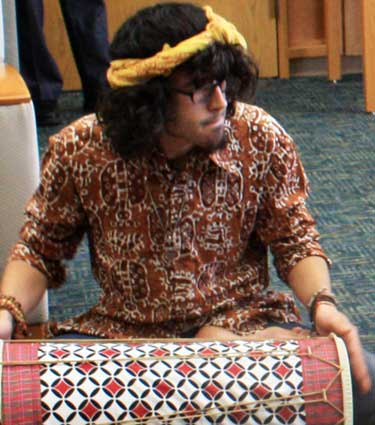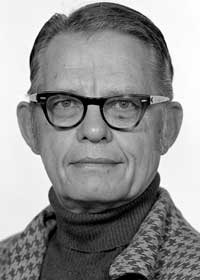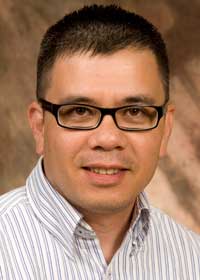
A member of the NIU Gamelan Ensemble helps to break the “quiet” rule inside the Rare Books Room of Founders Memorial Library.
Being loud might not be in the nature of librarians.
When it came time to open the Center for Southeast Asian Studies’ third 50th anniversary exhibit, however, University Libraries’ Southeast Asia curator Hao Phan was determined to draw attention to the subject of the show.
And so it was at 4 p.m. on a sleepy Monday, March 4, the sounds of NIU’s Balinese gamelan rang through the Rare Book Room to officially open “50 Years of CSEAS and the Donn V. Hart Southeast Asia Collection.”
The exhibition, which features selected materials from the Hart Collection and CSEAS archives, which will be on display through Saturday, March 30, as part of the center’s anniversary.
Considered one of the top five academic repositories of Southeast Asia research materials in the country, the Hart Collection contains thousands of books, periodicals, films and photographs as well as rare antique maps, palm-leaf manuscripts, original research materials and digital materials.
It is located on the fourth floor of Founders Memorial Library, where the collection has been since a 1977 relocation from its original home in then-Swen Parson Library.
During the opening ceremony, which began with welcoming remarks by University Libraries Dean Patrick Dawson, CSEAS Director Judy Ledgerwood recalled how assembling a Southeast Asia collection at the NIU library began within two years of the center’s founding in 1963.
Ledgerwood also noted the contributions of late anthropology professor Hart and library staff and curators over the years.
“For those of us who use the collection, we owe a great debt to professor Hart and the other founders who had the foresight to collect materials over the years, and to the dedicated staff who have worked to care for the materials and make them accessible,” Ledgerwood said.
Phan told how early acquisition efforts often fell to Southeast Asian Studies faculty, often at the energetic behest of Hart, a Philippines specialist who came to NIU in 1971 and served as CSEAS director until 1981.
“As [political science professor emeritus] Clark Neher recalled in a recent interview,” Phan said, “back in those days, before leaving NIU for Southeast Asia faculty members were specifically asked by Dr. Hart to acquire books for the library. He would say something like this to professor Neher: ‘Clark, now I want you to bring back 43 books. Now here are the boxes and here’s the address, and if you don’t bring back those books, look for another job!’”
But Hart’s urgency and creativity in securing funds to purchase materials, and in cajoling NIU’s growing number of Southeast Asia specialists to help, paid off in a collection that today draws scholars to NIU from around the country and the world. “From the very beginning,” Phan said, “Dr. Hart realized the importance of building a library collection that could support the studying, teaching and research for Southeast Asian Studies at NIU.”
In recognition of his efforts, the collection was named after Hart in 1985, two years after Hart’s death in 1983.
Today, the collection is still growing. But Phan, as curator, now makes the trips to Southeast Asia himself to look for and purchase new acquisitions.
“The collection has grown so much that it isn’t easy any more to ask a faculty member just to go to a bookstore in Southeast Asia and buy books for the library,” said Phan, who recently returned from such a trip to Vietnam, Cambodia and Thailand. “It’s a time-consuming process and yet, the materials that are often of the most research value, that make our collection unique, are the materials donated to the collection by faculty members.”
Most recently, history professor Kenton Clymer facilitated the donation of films and documents produced by the late King Sihanouk of Cambodia and anthropology professor Ledgerwood donated the research archives of pioneering Cambodia anthropologist May Ehibira, which were given to Ledgerwood after Ehibira’s death in 2005.


